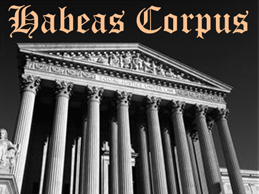Why You Need a Lawyer for Your Habeas Corpus Instance
Why You Need a Lawyer for Your Habeas Corpus Instance
Blog Article
Understanding the Function of a Post-Conviction Attorney in Seeking Justice After a Criminal Sentence
In the complex landscape of post-conviction lawful proceedings, the function of a post-conviction lawyer is essential in navigating the path to justice after a criminal conviction - south dakota federal habeas corpus attorneys. As the pursuit of justice extends beyond the boundaries of first process, the duty of a post-conviction attorney arises as a beacon of hope for those seeking to correct injustices and reclaim their civil liberties within the lawful system.
Post-Conviction Legal representative's Investigatory Job
Post-conviction attorneys take part in thorough investigatory work to reveal brand-new evidence, step-by-step mistakes, or misbehavior that could possibly cause reversing a sentence. This investigative phase is critical in the post-conviction procedure as it aims to recognize any type of overlooked information or legal bad moves that may have impacted the result of the initial test. Post-conviction attorneys explore instance data, witness testaments, and legal documents with a fine-tooth comb, looking for any inconsistencies or irregularities that can be grounds for charm.
With thorough investigation, post-conviction attorneys intend to shed light on potential oppressions that may have taken place during the initial trial. They might conduct meetings, speak with professionals, and testimonial forensic evidence to develop an engaging case for their clients. By looking at every aspect of the legal process, post-conviction attorneys work relentlessly to reveal any aspects that might have affected the judgment. Ultimately, their investigatory job plays a pivotal function in the search of justice and the possible reversal of wrongful convictions.
Crafting Appeals and Petitions
In the pursuit of justice after a conviction, proficient legal representatives meticulously craft appeals and petitions to present engaging debates for the reconsideration of lawful choices. Crafting allures and applications calls for a deep understanding of the lawful system, focus to information, and critical reasoning. Post-conviction lawyers examine trial records, determine prospective errors or violations of rights, and develop legal debates to test the sentence or sentence.
When crafting an allure, attorneys concentrate on highlighting legal errors that might have influenced the end result of the situation. They investigate situation legislation, laws, and legal precedents to sustain their debates. Requests, on the other hand, may entail offering brand-new proof that was not offered during the test or showing modifications in the law that warrant a testimonial of the sentence.
Furthermore, post-conviction legal representatives need to follow strict step-by-step policies and deadlines when submitting charms and petitions. They have to provide their arguments plainly and persuasively to persuade the court to give alleviation to their customers. With thorough crafting of charms and petitions, post-conviction attorneys make every effort to protect justice for individuals that have actually been wrongfully convicted or unjustly punished.

Pursuing Post-Conviction Alleviation
Post-conviction alleviation incorporates a range of legal mechanisms designed to challenge the credibility of a conviction or sentence. Post-conviction legal representatives play a critical function in browsing these complicated treatments, making sure that all legal alternatives are checked out to fix oppressions that may have occurred during the trial or sentencing phase.
One usual type of post-conviction relief is filing an application for post-conviction alleviation, typically based on cases of inefficient support of advice, prosecutorial misbehavior, recently discovered proof, or constitutional infractions. Experienced post-conviction lawyers have the skills and expertise needed to identify practical legal insurance claims, perform examinations, and present compelling disagreements to protect relief for their customers.
Utilizing Forensic Proof
When testing a sentence or sentence, the tactical usage of forensic evidence can be a powerful device in post-conviction legal procedures. Forensic evidence includes a vast array of scientific methods used to explore crimes and develop realities in court. Post-conviction legal representatives can leverage forensic proof to challenge the validity of convictions by providing new clinical findings that were not readily available during the initial trial.

Taking Part In Sentence Modifications
Post-conviction attorneys may explore the opportunity of sentence alterations as a legal method to deal with disproportionate or unjust sentences bied far in criminal situations. Sentence modifications entail looking for modifications to the terms of a defendant's sentence after a conviction has actually happened. These adjustments can include minimizing the length of a sentence, altering the kind of punishment enforced, or discovering alternative sentencing alternatives.
Post-conviction attorneys can seek sentence alterations via different lawful mechanisms, such as filing movements for sentence reduction, appealing for thoughtful release, or working out plea deals for minimized sentences. They need to meticulously evaluate the circumstances of the instance, analyze the lawful premises for looking for an adjustment, and existing engaging disagreements to the court sustaining the requirement for a revised sentence.
Participating in sentence alterations requires an extensive understanding of criminal legislation, punishing standards, and the certain procedures entailed in seeking post-conviction alleviation. Post-conviction lawyers play an important role in promoting for fair and simply outcomes by difficult sentences that are unduly severe or do not align with the concepts of justice.
Final Thought
In conclusion, the role of a post-conviction legal representative is critical in looking for justice after a criminal conviction. With investigatory work, crafting charms and applications, seeking post-conviction alleviation, using forensic evidence, and participating in sentence adjustments, these lawful professionals play an essential function in supporting for their clients and ensuring that their legal rights are maintained within the criminal justice system. Their commitment and knowledge are necessary in browsing the complexities of post-conviction procedures and achieving a fair end result for individuals facing criminal sentences.
Report this page